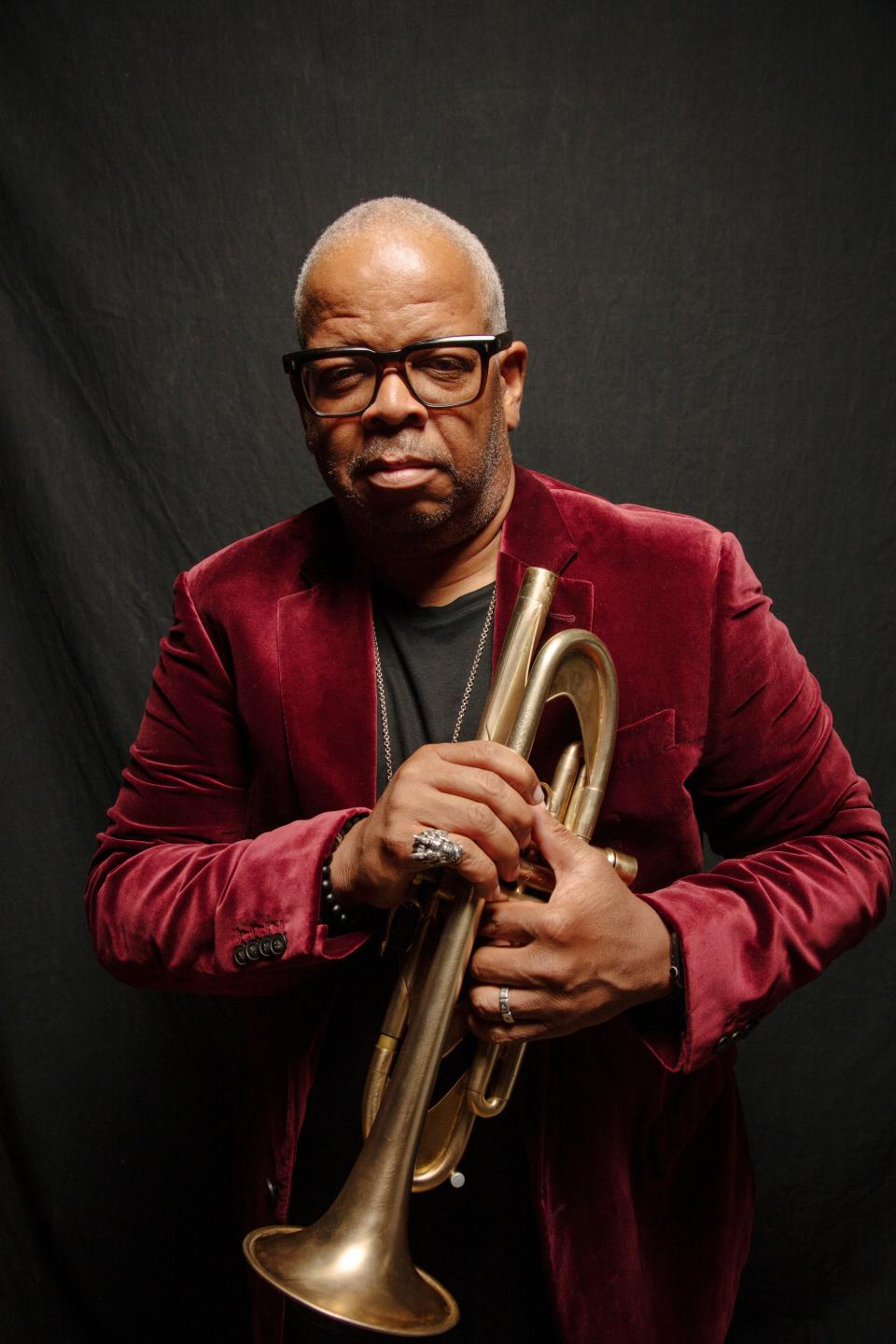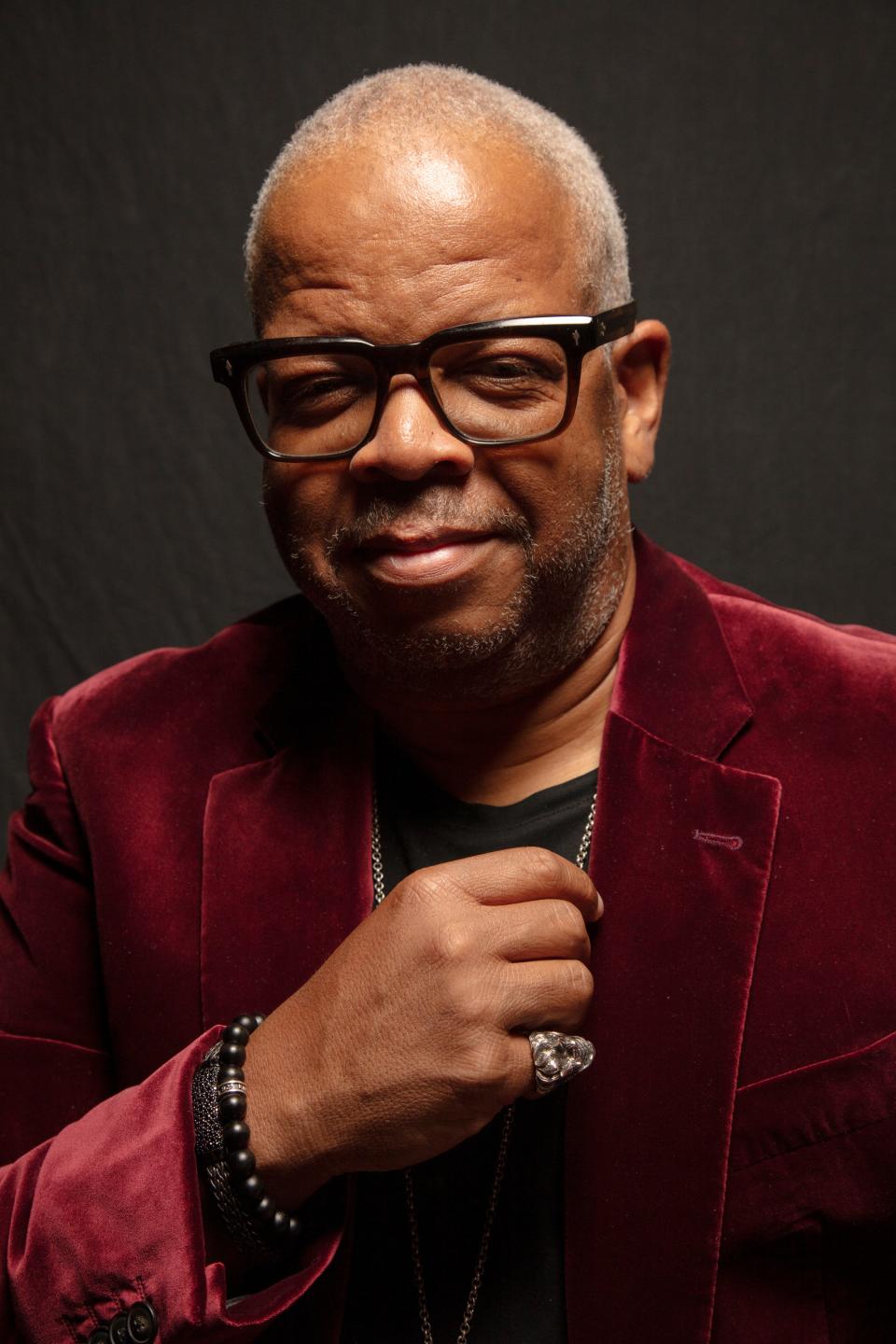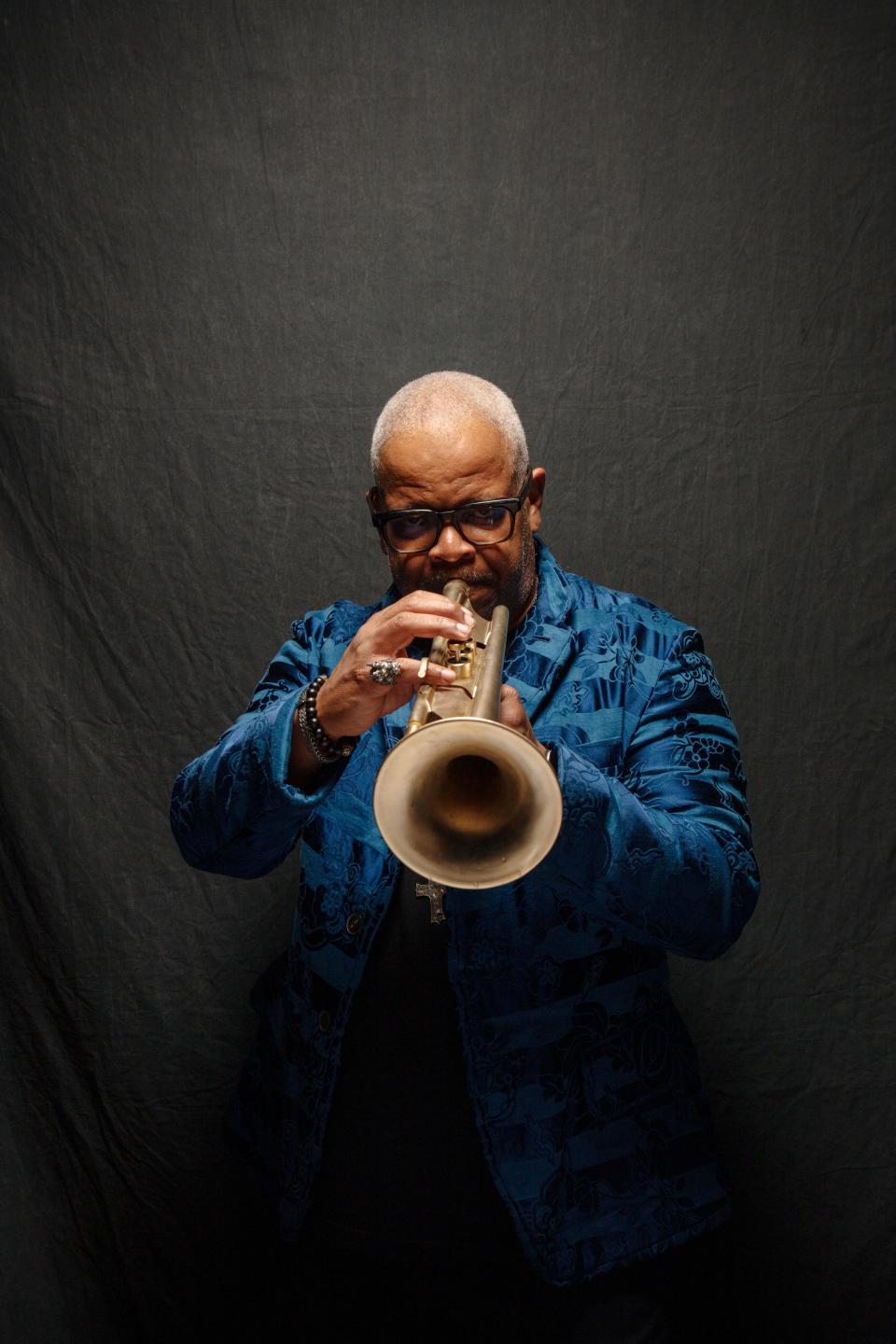'Healing souls': Terence Blanchard talks playing Portsmouth after making history at the Met
- Oops!Something went wrong.Please try again later.
- Oops!Something went wrong.Please try again later.
PORTSMOUTH — Grammy Award-winning trumpeter and composer Terence Blanchard has been a busy man lately.
His opera, “Fire Shut Up in My Bones,” premiered in late September at the Metropolitan Opera in New York City, making him the first Black composer to have his work presented there. He recently finished up composing the music for Spike Lee’s “Da 5 Bloods” film on Netflix, and he just released his new album, “Absence.”
Now on tour in support of this record (which is an homage to jazz saxophonist and composer Wayne Shorter), Blanchard will take the stage Saturday, Nov. 13 at The Music Hall in Portsmouth with his collaborative partners, The E-Collective as well as The Turtle Quartet.
Music to our ears: Portsmouth Symphony Orchestra to launch series at Jimmy's
Seacoastonline.com caught up with Blanchard to discuss his love for Shorter, his work with the Met and what that meant to him, his desire to play football, the importance of being an educator, and his storied and inspiring musical career.

Seacoastonline: Before we jump into your show coming up at The Music Hall this weekend, I’d love to touch on your role in the Met Opera, “Fire Shut Up in My Bones,” which premiered in late September and was broadcast here in Portsmouth at The Music Hall in October. What an amazing experience to be the first Black composer in the Met’s 138-year history to score an opera. It seems like it took too long for this to become a reality, but what does that entire experience mean to you? Congratulations.
Blanchard: Well, first of all, thank you. But, yeah, it’s a weird kind of existence. Number one, to be at the Met, just in general, being the first African American as you say, it comes with a mixed bag of emotions. I’m honored, but I’m not the first that had the ability to do this, you know? As a matter of fact, I saw that William Grant Still was rejected three times there, which was a little disappointing because he’s such a great composer. And another part of it is, having understood that, everybody in the production understood their roles and took ownership of them. Everybody knew we had to go well beyond what we were accustomed to doing because we didn’t have a lot of rehearsal time due to budget constraints and stuff like that — this new reality after the COVID pandemic. But even with that, everybody stepped up to the plate man, and I feel like they all did a phenomenal job. I was very proud that the world got to see and hear these voices in these roles. Even though they can do Puccini, Wagner, they can do all of that, but this was so conducive to their singing — it gave them the opportunity to bring that church background, that roots background, that jazz background to the opera stage. I was overwhelmed by the entire thing. I still am. I mean, it’s done and we’re moving on to the next thing, but still, the effects of it are quite profound.
Seacoastonline: Switching gears a bit, let’s talk about your new record, “Absence,” your homage to Wayne Shorter. Let’s first start with the influence Shorter has had on you as a musician. What’s the history there?
Blanchard: If there was no Wayne Shorter, there’d be no Terrence Blanchard, that’s the long and short of it. I loved Wayne’s music, man, from the time I first heard it when I started playing jazz. Heard it first with Miles Davis, and then with Art Blakey, and of course his own records that he put out on Blue Note. I was so influenced by his compositional style. He seemed like a guy who wanted to learn how to be a writer from the very early days of his career. You hear him developing new melodic ideas in his early years in the business and, just as he’s evolved, that ability and talent has blossomed into one of the most creative minds in the world of music, you know? There’s nobody like Wayne. He is such an original. Even in his improvisation. I was talking to Herbie Hancock about it once, I was like, "Man, I’m so tired of playing eight notes" (voices a run), you know, those type of lines, And he was all "Yeah, if you notice, Wayne doesn’t do that. He’s never done that." And still people consider him to be one of the most creative minds in the business, but they still go back and play those eight notes (laughs).
Let's hear it for her: Biddeford native Amy Mantis releases new single
That’s one of the things that I take away from Wayne, it’s like, ‘No, don’t do that. Try to create ideas and develop new approaches.’ That’s one of the reasons we did some original music alongside his compositions. He’s always encouraged us to have our own voice and develop our own sound. The first time he told me to do that I was kind of stunned. He was all ‘You have your own voice, man, go on and do your thing.’ And I’m like, ‘Wow, did I just hear that from Wayne Shorter?’ So doing an album of just his music would do him a serious disservice because that’s not what he’s totally about. For us, doing an album with his music and our music, it gives you an opportunity to see just how much he’s influenced us. When you listen to “I Dare You,” you can see how much of an impact he’s had on all our lives.
Seacoastonline: What were your goals behind this record? Sonically, it’s beautiful. It’s not a “standard” jazz record, which isn’t necessarily anything you’ve been about for quite some time. There’s a lot happening. Can you sound off on what you were looking to accomplish and what The E-Collective and the Turtle Island Quartet added to the project?

Blanchard: A lot of it has to do with what you just said. A standard jazz record. What is that? Wayne has always said — and the reason I named that tune I was just talking about — he’s always asked, rather, "What does jazz mean? Jazz means I dare you." So that’s the whole idea behind it. Let’s investigate the stuff that we like. I like those sonic elements. I like groove-based elements. I like those harmonic passages. I like those colors. It’s about taking all of those elements and seeing how they fit together, not being beholden to what we think we should be doing. You know? To me, that’s what Wayne has always done. He’s never looked back. He’s always moved forward. He asked me at a gig once why the bass always had to have a standard pattern and why it couldn’t play melodies like him. And I was kind of like, yeah, why is that? There’s no hard and fast rule. We tend to get stuck in these realms of creativity thinking we’re being creative, but no, we’re not. So, for me, why not investigate all kinds of things? There’s not a steadfast rule about what jazz is supposed to be. We know what it was, right? But it’s constantly evolving and growing. So why stick to a certain thing? Why go back. I understand we need to study our history and know where we came from, but why do we need to stay there?
Seacoastonline: I love that quote that came out of Wayne Shorter’s mouth. “I dare you.” I appreciate you going into that, because obviously it holds weight with you as a musician but also as somebody in the audience or listener of the records like myself, I think that that quote has a similar, but different sentiment, you know? I think that jazz as a genre is very vast. I mean it's hard to sort of pigeonhole it all the time, so “I dare you” seems to be a welcoming sentiment from every vantage point with that type of music.
Blanchard: Yeah, you’re right. And that’s the whole thing. And listen, let me say this, all too often in the jazz world, the musicians’ kind of expect the audience to come to us, but I don’t subscribe to that. When they don't respond, you know, there can be a feeling that people there, they don't understand what it is we're going. But again, I don't subscribe to that. Louis Armstrong was one of the greatest musicians on the planet, ever, and one of the most beloved, because he knew how to create music that inspired people. That’s my whole thing, man. Art Blakey used to say, he used to tell us, "Man, never play above your audience, never play beneath them, just play straight to ‘em." You know? He also used to say, "You never want to be too hip, because two hips make an ass." (Laughs.) So those are the things I live my life by. It’s like, I want to try things, I want to push the envelope, but I want to do it in a way that’s meaningful for people that are going to be listening to the music because the music isn’t about me, it’s about healing souls. It’s about being a healing agent.

Seacoastonline: In general, why music? Why do you seek it? Why do you create it? You’ve been in the game for a long time.
Blanchard: Well, that’s just because I think I was meant to do this, really. I think it chose me more than I chose it. Because I wanted to be an athlete, bruh. I mean, I wanted to play football, I wanted to ball, bruh. But I’m 5’10”, you know what I mean? (Laughs.) So that wasn’t going to happen. I’ll never forget playing in band in high school, walking out to do the Bayou Classic at the Super Dome (in New Orleans), and them big dudes were getting off that bus and I was like, "OK, yeah, that ain’t for me. Nope, nope, nope." (Laughs.) So, music became the real focal point of my life. But I love both things. I’m still a big football fan, and I still love music so, music just became more of the thing I gave my life to. Once that happened, I became really serious about it as an artist.
Seacoastonline: Man, you could’ve balled. There’s a lot of five-foot something running backs in the NFL. You fast, or no?
Blanchard: Yeah, bruh, and how long do they last, bruh, what, two, three years? Sam Mills was one of the guys I really admired because he was a linebacker and my height. He was a hell of guy, but, yo, he got beat up dude. (Laughs.)
Seacoastonline: Alright, alright, I hear you. So, what led you to pick up the trumpet initially? ... Further, when did you decide, ‘Yep, this is the path I’m going to spend my life walking down’?
Blanchard: Of course. There was a guy named Alvin Alcorn, came to my elementary school. I was in fourth grade. I can remember it just as clear as day now. We were all in the cafeteria sitting on the floor. They cleared it out, sat us on the floor, and he had this band … And he was just leaning up against the wall. They were all set up on the back window. And I’ll never forget when he started playing, man. I had been playing piano at that point—started playing piano when I turned 5. I just remember thinking that the piano couldn’t do what that trumpet was doing. I went home after that and told my dad I wanted to play trumpet. That was that.
Seacoastonline: Alright, let’s get back to the tour. Did you miss being on the road during the pandemic lockdown? Have you gained a different appreciation for traveling around and playing for an audience in a live setting?
Blanchard: I can’t tell you that I missed the traveling part. I don’t do well with planes, man. But the actual playing part? Yeah, man, that’s the stuff. I can’t explain to you the way I missed it. You don’t realize how much you miss something until it’s going, you know? And when it’s gone and you come back, man. I gotta laugh, because when we all got back together and started working, started playing, there was a couple hours of everyone having a bad case of the "I love you mans," you know what I mean? (Laughs.) But, yeah, it’s been beautiful playing. It all means something else now. I don’t exactly know what that is, but I just know that each moment on the bandstand is more of a cherished moment now. And I cherished before, don’t get me wrong. But, yeah, now, it’s just something different. And to see people come out and hear music live again, and to be playing to a live audience and engaging with each other… It’s just magical. It’s nice. It’s just comforting, uplifting, and inspiring.
Seacoastonline: One stop takes you to The Music Hall here in Portsmouth this Saturday, Nov. 13. What excites you about the gig? What can folks expect?
Blanchard: We’ll be playing a lot of music from the album. That’s been our focus and we’ve been having a lot of fun doing it. And then, let me tell you something, the Turtle String Quartet? Dude… They’re different man. It’s something different. I’ve been listening to them every night and it's interesting because they’re redefining what that is. What different is. Those guys are jazz musicians, man. Jazz musicians that play those stringed instruments which is wildly interesting. It’s fascinating having them in the group, too. We’ve been learning so much from each other. To the point where we’re getting excited about doing another project together. I think we’re feeding off of each other and challenging each other to play music we didn’t know we could make. It’s been a trip.
Seacoastonline: In parting, I just wanted to touch on the fact that, in the midst of all your work as a musician and composer, you’re also a teacher at UCLA. What do you appreciate about switching gears and bringing the lessons you’ve learned in your career to a classroom setting and inspiring the next wave of musicians? What do you gather from this experience that might inform your own approach to music?
Blanchard: I’ll take that last part first. For me? Listen, man, all these young kids are coming up with all the new ideas, man. There’s no shortage of ideas coming from our youth. That always inspires me and keeps me on my toes, often taking me out of my comfort zone, which I appreciate. The main thing that I love though, just happened the other day… I give all my kids the skills and traditions that I was taught. The roots. You gotta be grounded before you can push ahead. From there, I challenge the kids to write. I want them to write in a way that all points back to their original idea. There has to be context to lean on. So, one of the kids asked to talk to me after class and I, of course, said sure. He showed me his piece. I was looking at it, took one of the ideas and said, ‘Look bruh, your piece is always staying in the same range. You just need to build, to ascend.’ So, I showed him what I meant real quick in the context of his idea and I could see the lightbulb go off immediately. He locked right in. To see that, that’s the reason I do this, because that’s what somebody did for me, you know?
He went "Ohhhhh!" And I said, "Right?" I knew right then he came up with a ton of new ideas about what he could do with his piece, and how he could approach things moving forward. There’s real power in that. That’s what I want. I want people to be excited.
Who am I to horde all this information that someone else taught me? It’s nothing I created. It’s just been there. It’s something I’ve got to pass on. And, in doing so, we collectively enhance our listening pleasure because these kids are gonna come up with great ideas.
You know what I’m saying? I’m not teaching people to write like me, I’m teaching them how to develop their own ideas. Showing them a different variation of what they have, to further their original idea. As a result, man, magic happens. That’s what I get enthused about. What are you all gonna come up with next? That’s what I get from it. Furthering the development of creativity amongst our talent and giving them the skill to develop their talents to write something that I may never write that we all can benefit from? Yeah, man. That’s the stuff.
Seacoastonline: Terrence this all sounds very Wayne Shorter of you.
Blanchard: (Laughs.) I told you. I told you. I told you, bruh. If there’s no Wayne Shorter, there’s no me. It’s all connected, man.
Go & Do
Who: Terence Blanchard with the E-Collective and Turtle Island Quartet
When: 8 p.m., Saturday, Nov. 13
Where: The Music Hall, 28 Chestnut St., Portsmouth
Admission: Tickets range from $52 to $68 for in-person performance; $15 for a livestream of the performance
More info: Visit themusichall.org. Proof of vaccination or proof of a negative COVID-19 test within three days of the performance is required. Masks required for children under 12, encouraged for everyone and highly encouraged for those who are not vaccinated.
This article originally appeared on Portsmouth Herald: Terence Blanchard talks playing Portsmouth after making history at Met

